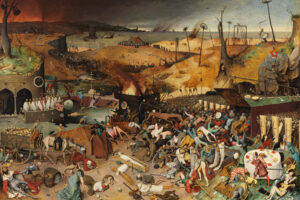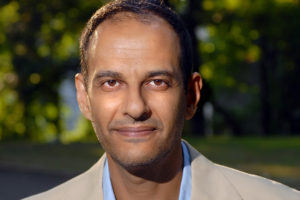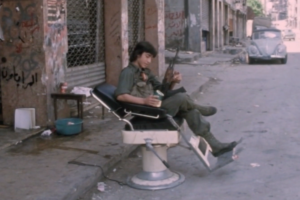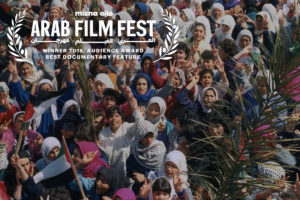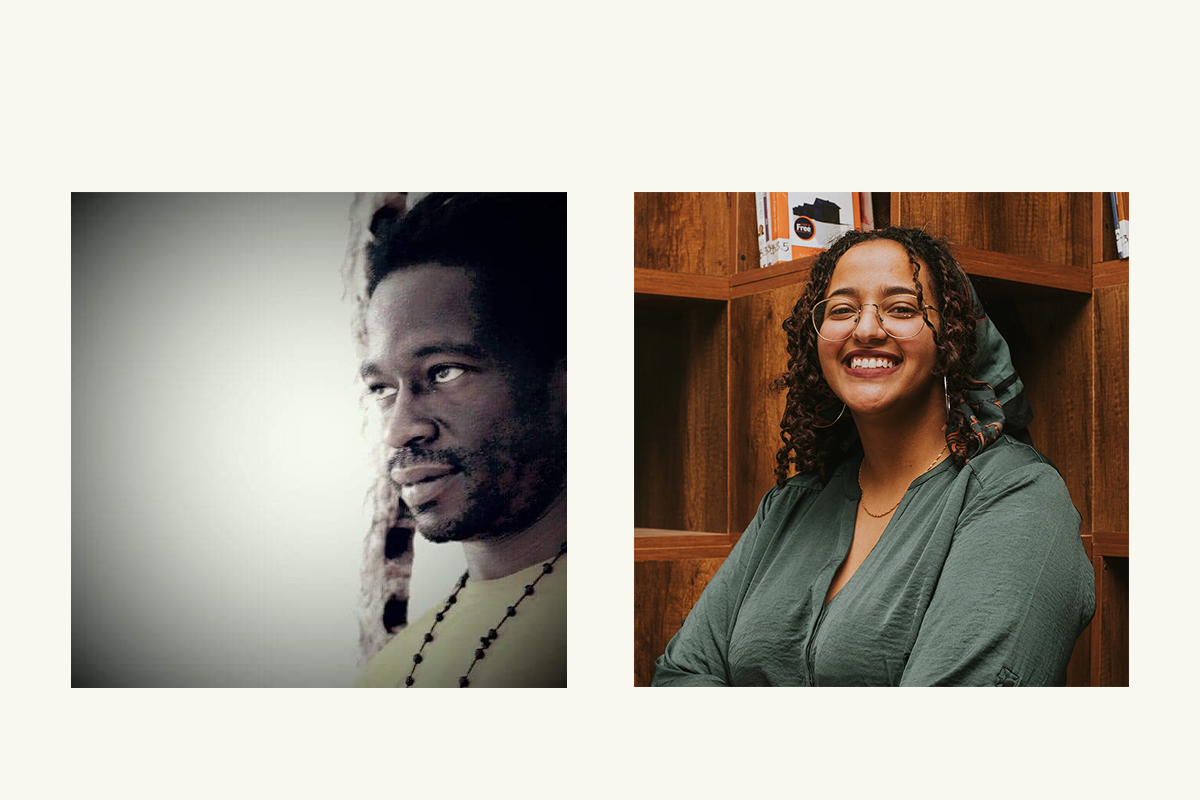
August 2, 2021
“Our Identity as Human”: Interview with Anis Chouchene by Ruba ElMelik
Following the murder of George Floyd in 2020, an eruption of anti-brutality riots commenced across the U.S. in support of Black lives. As the riots began to spread outside of Minnesota and the United States and into other parts of the world, the celebrated Tunisian poet, Anis Chouchene, known for his outspokenness regarding anti-Blackness in the Arab world, released a scathing poem titled Black Lives Matter. In the work, he discusses the history of inequality Black communities face and the farcical denial of racism towards Black people. I met with Chouchene over a call where we discussed the importance of selfishness in a world full of bigots, the hypocrisy found in Arab reactions towards anti-Blackness, and the existing paradigms that shape race discourse in Southwest Asia and North Africa.
This interview has been translated from Arabic and edited for length and clarity. Read Anis Chouchene’s poem, Black Lives Matter, and its translation into English by Abed Awad and Kareem James Abu-Zeid.
Ruba ElMelik: You introduce yourself as “Tunisian by nationality, African by identity, and human by belonging.” Your poetry similarly reflects this idea that humans may be different but ultimately we are all the same. Can you talk more about this?
Anis Chouchene: It’s clear. My faith lies in the belief that we are all different but the only thing that truly unites us is our identity as human. The rest are all details: nationalities, borders, races, and colors. They all mean nothing. Ultimately each person’s stances, decisions, and ideas are what determine [who they are]. I have an issue with our Arab communities regarding this matter, and by this I mean that we happen to be ardent fans of collective hypocrisy, ranting, and flashy sentences such as “We are all Muslims,” “We’re all Arabs,” “We’re all, we’re all…” And we have stagnated there, in the “we are all.” [These platitudes] are all things that hold no value to me, they’re meaningless to me. Even in my writing I try to war with these meanings— these ideas are the ones that have led us to these conditions that we’re in.
RE: How do you hold onto that hope? How do you hold onto this idea that we are all one people when you live in a world that doesn’t treat you or us like we are all one?
AC: Because I hold on to myself, because I’m selfish. [chuckles] No truly, it’s because I already have a different definition about selfishness. Selfishness and self love are things that are extremely, extremely important; shaping self-awareness hinges on them for any human being. My insistence is that we live as we feel and as we think—just because others are wrong doesn’t mean they have the ability to make me lose my hope in my own life. And that’s because I hold on to my thoughts and beliefs.
RE: Do you consider selfishness to be a part of self love?
AC: Yes. The saying, “I seek refuge in God from the word ‘me’,” makes me laugh. I don’t understand this sentence. Whoever said it, was a fool. If I sought refuge in God from my own self, then what would I have left?
RE: Your poem, “Black Lives Matter,” discusses the realities of Blackness, historical traumas and the widespread refusal to see racism as real. When did you write this poem and how did it affect the people around you?
AC: I wrote that the same week the events surrounding the murder of George Floyd occured, because the reactionary dialogue and snarl was becoming excessive. People’s reactions are always laughable to the point of disgust. Because our Arab communities always try to avoid their mistakes, they get happy when these same wrongs are practiced in the West. They feel at ease. We always claim to be Muslims. I always hear the same sentence, constantly repeated: Bilal, the Prophet’s muezzin, Bilal the Prophet’s muezzin.
RE: [laughs] As a Sudanese person I hear this a lot.
AC: As if it’s something that he recited the call to prayer. I mean, where’s the pride? [laughs] It’s something really laughable, especially since [Arabs] have never asked [themselves?], “Why did Bilal never marry?” They never asked that question. And, “Why wasn’t Bilal accepted?” They claim only that they removed slavery and that’s not true, with the evidence being that those after Bilal were called Rashidun Calipahtes. As if they were the paragon of maturity. [Scoffs]. There is proof, as I said, in the fact that in most successive Islamic civilizations there were slave-women and slaves, and that these practices continued.
And slavery persists anyways in Arab communities today that practice the neo-racism of kafala/kafeel sponsorships (“kafala”) and sponsors (“kafeel”). Denial is the other problem. So the framework for discourse regarding all of this made me write this poem, because we don’t always favor writing on this topic. Racism, to me, isn’t a racism against color, but a racism against thought. [The racist] attacks your ideologies—its discrimination against difference—so he attacks your differences whether they pertain to religion, gender, physical appearance, color, discourse. He wars with you and your differences. So colorism is part of a larger and deeper discriminatory practice in our communities.
RE: You know, we’re talking about the Arab community’s reaction to George Floyd, and you said something so important, that there’s this joy– or rather, that it is as if the murder of George Floyd in the U.S. improves the way they look at themselves, like, “This didn’t happen here. This happened there, so we’re better.” What were the reactions of the people around you or the Arab community when you wrote this poem? Was it widely disseminated? Who read it?
AC: Yeah, in a span of two days it reached 300,000 views on Facebook. The engagement was really positive. I don’t often read comments. Despite the denial in which the Arab community is adept and masterful, the majority of people [were positive]. I have a deep faith that there is a new generation that refuses this denial and this practice. Only a person who is a failure themselves would celebrate another’s failure. They don’t have the ability to learn from their own failures and grow, so instead they wait until others fail so that they can feel at ease. But as I said, throughout the whole Arab world, there is a new generation emerging. It’s hard to see the light because of these dictatorship governments, but the situation will change—it has already been in a framework of change for the past decade, ever since we did what was called the Tunisian revolution, the Arab Spring [“Spring,” he repeats to himself, chuckling.] I have hope because of the reality that we live in; there is a change in the youth that can be felt and that is tangible to me. They engage in a number of activities within civic frameworks. I am in direct and constant communication with young adults and children, especially. This mentality belies a framework of change.
RE: How does it feel to be an artist during so many historical moments in time? The Arab Spring revolutions, the pandemic, the Black Lives Matter movement..
AC: As Adel Emam said, “Everything we were hoping to see, we have seen.” [laughs] We live under strange circumstances. It seems as though people have started to feel that [the period] starting from the past ten years until now equals a hundred years. [We have gone] from experience to experience and from pang to pang, especially here within the Arab region, and now from catastrophe to catastrophe and from shock to shock, especially with what happened with the Saudi, Emirati and Bahraini normalizations [of relations with Israel]. And then the shock with regards to that in Morocco. [sighs] So, may God protect us from what may come, God forbid.
RE: Unfortunately, Sudan was amongst those countries [to normalize ties with Israel].
AC: Yes, yes! But I was attacked when I brought up Sudan, because I went to Sudan in 2018. I held an evening in Khartoum that had an incredible audience turnout in Al-Saha Al Khadra.
RE: So why were you attacked? I’ve read about this somewhere.
AC: Because they thought that when I wrote a poem about normalization, in which I said, “Normalize, and normalize, and in [your] normalization, excel” that I was discussing Sudan, because it was released around the same time news spread that Sudan was preparing to normalize relations. But the outcry made me laugh because even if I were discussing the Sudanese government, I was not discussing the Sudanese public. This is the same denial: if I discuss my country, [the audience] replies, “It is as if you were speaking about mine.” But if I do speak about your country, I become your enemy. And if I speak generally, then ‘We are all Arabs’ but if I speak specifically, then it’s, “Ah. What even brought you to us? You’re Tunisian.”
However, I strongly believe this to be a small demographic, because collective consciousness amongst peoples is shared. And it has been largely positive thinking. It is a small minority that controls authority and cuts its teeth on us. So it wouldn’t affect me even if everyone attacked me because of—turning back to selfishness—my strong faith in myself.
RE: Over the past summer we’ve seen in the U.S. a massive interest in social justice movements and poetry and writing that addresses them. However, by autumn much of the interest had waned. How was it for you in Tunisia? Do you often feel these oscillations as a writer?
AC: Well, in Tunisia the situation is a little different, because we have internal conflicts and concerns that are—I wouldn’t stay more important because every issue is important to whomever lives it—but here in Tunisia we’ve been in an organizing state since 2010, working on changes, political differences and economic and social crises. So adding Coronavirus to that and the ways in which it has affected the economy and the Tunisian community… Plus, we have accustomed the Arab community to be one with a memory like that of a goldfish. The Arab community could be discussing an extremely important issue today, and tomorrow you will find them discussing Rania Yousef’s dress. The extremely trivial becomes important and that which is important is reduced to nothing.
However, the rhythm that occurs in Tunisia especially [happens because] we live in increasingly difficult times, but I am extremely optimistic. My optimism really comes from youth movements that advocate for freedom of thought, freedom of speech and democracy in Tunisia. We have proved through two elections that the system, with all its hindrances that it faced, is moving in a good direction with a stable plan. There are a few stumbles from political parties, but it is steady with regards to spreading a culture of democracy. In my opinion, we cannot change a political system that lasted for sixty years in ten years because the same mechanisms, mentalities, and elders that take control are the same ones still in power. But, they will go. They will go.
RE: When the Arab world discusses racism, race, or Black people, our frameworks usually aren’t ones that reflect a deep level of lived experience or understanding. There is a certain level of discourse that, when happening in the West, is imported to the Arab world so that we may speak of racism. However, the levels of discourse here and there aren’t the same. How do U.S. conversations change or compare when brought here? Do you feel like these attempts exist, or do you see genuine Arab frameworks for conversations about racism?
AC: There are attempts to import Western discourse in order to claim that the West is saying one thing and doing the opposite. Like France, which claims to offer rights and tolerance of others and in its motto invokes equality and liberty even though it is a racist and criminal country. Meanwhile, their exploitative mechanisms take advantage of the riches of African countries while killing their people and selling them weapons. Arab governments don’t do anything [to address racism] except exploit any lapse in the West so they may say, “Here it is happening in other countries, too.” So exploiting this discourse isn’t strange and we’ve been doing it for decades. But I believe, going back to new consciousness—especially post the information revolution and the permeation of information—that the situation has definitely changed. There is this collective negation of fake news, people now know what happens here or there, and the secret deals that happen between this person and that. People are no longer gullible or easily fooled by these tricks. The Arab communities suffer from the control of authoritative governments, such as what is happening in Egypt—one of the most oppressive regimes—and yet you have France, which claims rights of freedom,giving Sisi a medal. Meanwhile, people are being arrested and thrown in jails.
RE: It is as if it’s all stage play. Not real life.
AC: Well, yeah. It is a play, and the problem is in the people who are complacent with living it. For that reason I told you earlier, when you asked me how I don’t lose hope, that I don’t because hope is a hope in myself and my life. I am not tied to someone else in order to live how I want to live. But the issue here is the blend between two concepts: the concept of the state and the concept of the motherland. It is always theorized that whoever is against the state is against the motherland, and that is a falsehood. People think you must love the president and love the queen. What is required of me is to love my father and my mother, not individuals. As if [the state] will give you a deed of forgiveness or patriotism [if you are loyal]; that is incorrect! Not a single human being can or will give you keys and grant you your own life. Only you can give yourself those keys. And the world is expansive. As Mahmoud Dariwsh said, “All the hearts of the people are my identity / So take away my passport.”
RE: You’ve mentioned the newer generation a lot throughout our conversation, and in your poetry too. You include conceptualizations of sons and grandsons and ancestors a lot in your poetry, to the measure of “what would they say?” or “what shall I tell them?” if they were to see the hypocrisy in our communities. What pulls you into imagining your responsibility through the lens of your ancestry?
AC: Because it is not a matter of imagination. In my family, I don’t have any offspring, that is true, but I have relatives and I want them to live in a country that respects its citizens in which they won’t be “slaves.” This is a responsibility. And a responsibility deeper than this is that—if this Islamic concept is followed—people are “the caliphates of God on earth.” Therefore, this caliphate needs to do something for the continuation of life in this world. So my resistance does not fall within an imaginative framework as much as it expresses a clear reality. In this matter, we cannot call ourselves selfish [laughs].





